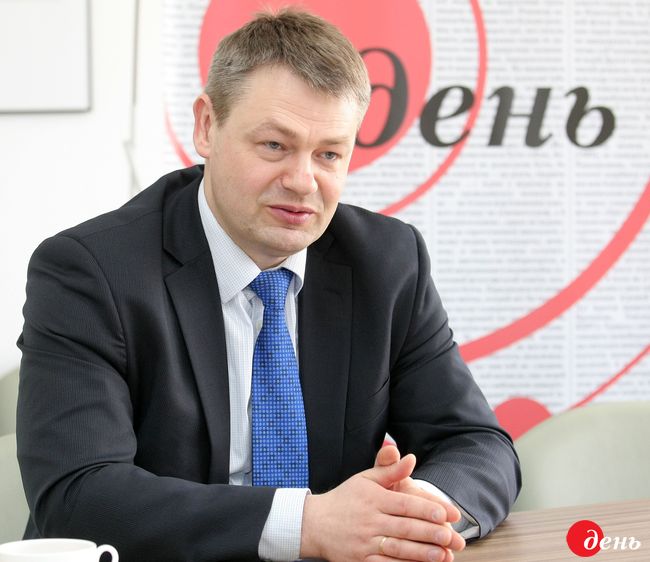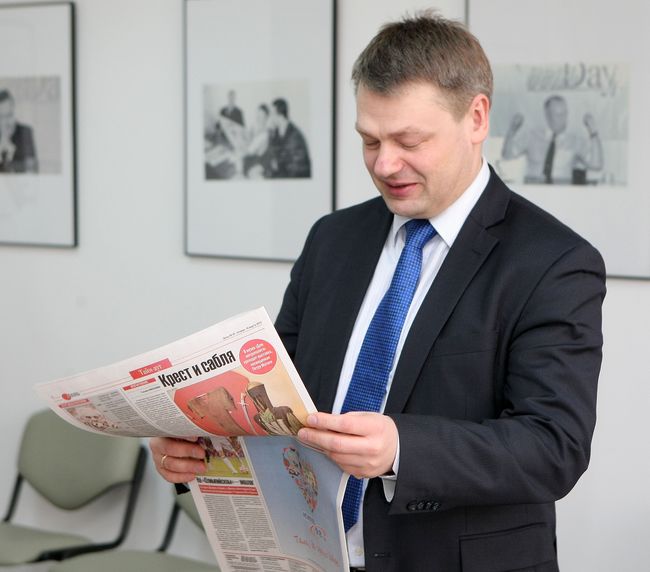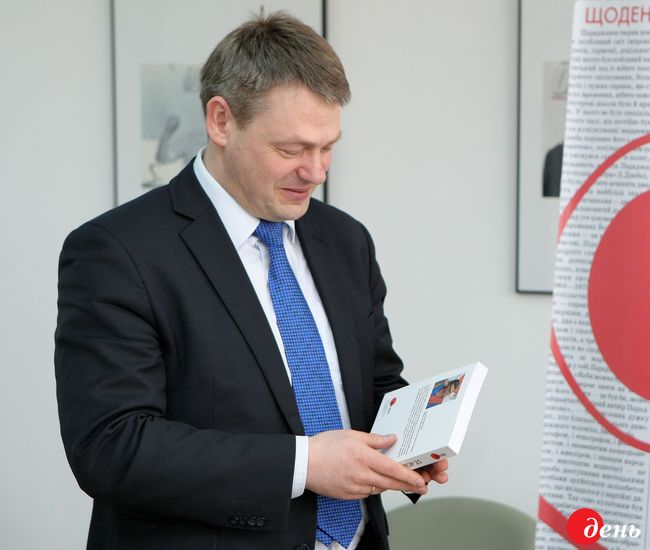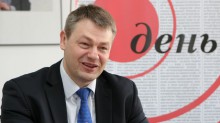Today’s interviewee is one of the most experienced experts in the sphere of reforming and getting closer to the European Union. Lithuanian Nerijus Udrenas for 10 years has been the head of the group of advisors of Lithuania’s president Valdas Adamkus and the incumbent president of the republic Dalia Grybauskaite. In the end of October past year the Ministry of Foreign Relations of Lithuania sent Mr. Udrenas to Kyiv to help the government of Ukraine in implementation of the Ukraine-EU Association Agreement. Nerijus Udrenas made it precise during the interview to The Day that he, like before, remains a citizen of Lithuania and is paid only by the Lithuanian state.
To what extent has Ukraine advanced in the implementation of the regulations of the Association Agreement with the EU? What should we expect from the Riga Summit and why Dalia Grybauskaite is considered one of the most powerful politicians of Lithuania and the EU? These and other questions are raised in the first interview Nerijus Udrenas has given since he became an advisor at the Cabinet of Ministers of Ukraine.
Mr. Udrenas, tell me, how was the decision on your business trip to Ukraine made? Whose initiative was that? What was your task?
“Apparently, during the establishment of the Office for EU Integration in Ukraine it was concluded that the Lithuanian experience would be quite successful in this sphere, that’s why I was invited.
“At first Lithuania was lagging behind in its preparation for joining the EU. But we soon gathered up, improved, and got into the first wave of EU enlargement. At the moment by many indicators of using the European money and reforms we are way ahead of Estonia and Poland, especially in terms of the life standards. According to 2013 data, the average index of life standard (GDP per capita) in Lithuania is 75 percent of the European level. And we keep growing. We aim at achieving an average standard of life in Europe. Of course, it is not simple, but we are on this way.”
You’ve said that Lithuania was lagging behind in its preparation for joining the EU. But all ambassadors of Lithuania to Ukraine have told me that your country, vice versa, was the one that pulled Estonia and Latvia to the EU and NATO.
“We are a small, but an ambitious country. They say that Landsbergis (Vytautas Landsbergis is an ex-head of the Seimas of the Republic of Lithuania) was the first one who expressed the idea of independence back in the time of the Soviet Union. This ambitiousness has cost us a lot. The economic blockade of the Soviet Union had a strong effect on Lithuania. I remember, when I was studying at university, the air temperature inside the premises was 9-10 degrees above zero. I was studying in a fir-coat and mittens. But everyone believed that we would have a good future and that we would solve these problems somehow. Of course, many companies shut down, but we have preserved a lot. At the moment the share of industry in the GDP is 23 percent. Our industry is export-oriented – especially towards the European market – it has helped us to survive the crisis in 2008 and 2009.”
Aware of your personal contribution to the processes of establishing the Lithuanian economy, what task did the Ministry of Foreign Affairs of Lithuania set before you when it was sending you to Ukraine?
“My task is to help the Ukrainian partners to coordinate the European integration, in particular, realization of the Association Agreement, which Ukraine signed with the EU. With this purpose the Office for EU Integration was created in the Cabinet of Ministers. In Lithuania we had similar programs on coordination. This is a narrow task.

“Another, a broader task is in seeing whether there is a possibility to help other experts, and we will send an expert assistance if we have a possibility to do so. The advisor on governmental enterprises works in the Ministry of Economy. Our reform in this sphere has helped to increase the revenues to the budget. This week we have sent an expert on purchasing medications from Lithuania to Ukraine. Our experience in energy sphere is important too.”
Do you help the Ukrainian government to get ready for the Riga Summit?
“This is more a task for our ministry. I’m not taking a direct part in the preparations for the Riga Summit. But our support and my presence show that we are deeply concerned about the Ukrainian future and Ukrainian reforms. We want as many as possible guaranties to be given to Ukraine at the Riga summit.”
What guaranties do you mean? Your ex-premier Andrius Kubilius said in an interview to The Day that it would be very good if Ukraine was given the EU candidate status. Do you think it’s realistic? What can be the minimum and maximum programs at Riga Summit for Ukraine?
“Of course, you want to make the visa regime more liberal. That is what your president has been stating. But you will hardly be given the EU candidate status. We always support Ukrainian aspirations, but you should look more realistically at the question of a candidate status. It won’t be given at the moment. There are criteria and you should do some work to meet them, to show the reforms. Or at least make a plan and show the beginning of its realization.
“That was what we did in Lithuania. At first we wanted to do everything quickly. We didn’t expect that we would have to wait for so long. But when we saw that there are many small, but important victories, we understood we had to prepare. This included building of market economy, democracy, fighting corruption, etc. You should plan this work, too, concrete programs on implementation of the reforms. You should regularly show the results, and then you will probably have a possibility to get the EU candidate status.”
You’ve mentioned that Office for EU Integration has made its first report on the achievements. What was it about? What has Ukraine really done on the way to EU Integration?
“In this report you can see what plans have been realized. On the whole it says about the plans of implementation prepared by different ministries. And the task of the Office for the EU Integration is to see that these plans will meet the directives and legislation of Ukraine: what situation is at the point A and what result should be at the point B.
“You must understand that the question of EU Integration will be an internal one and will be more often discussed at the sessions of the Cabinet of Ministers, therefore the coordination between the ministers should be enhanced.”
Shouldn’t the vice prime minister or even the prime minister himself be involved in this? What can you say?
“There is a need for political assistance from the above. On the other hand, people are needed to prepare all these documents, strategy, etc. But for your country, while you are still not a candidate, there is no need for the prime minister to take a direct part in this. Most importantly, a respected man with an interinstitutional and interparty status should be at the helm. In Lithuania we created a department on the European law, so that all of our laws were checked for compliance with the European principles and regulations. The department was headed by man who was much respected as a politician and as a lawyer. He was sitting at the Cabinet of Ministers and always gave an impetus for European ideas with his authority. I think a similar structure will for sure appear here. There is an office on coordination, we also need a legal department with an authoritative lawyer who would say that such things can or cannot be accepted in the EU. I know that people in your country are already thinking on this question.”
Who is at the helm of the office where you are working? What minister is in charge?
“There is a minister of the Cabinet of Ministers who is a direct supervisor of the head of the Office for EU Integration.”
As a person working inside of the Ukrainian bureaucratic system, what can you say about it? How is it changing? In what direction?
“I don’t have connection with the entire bureaucratic system, so a generalization would be inappropriate here. In the ministry I work in, I see many young people who want Ukraine to become a new country. They must be shown to the country: at different meetings, in the press. They know languages, imagine the European future of Ukraine and what needs to be done for this. It is just that they are too innumerous at the moment. There must be much more.”

So, if we have understood you correctly, in Lithuania there has been no practice to involve foreign experts on executive positions?
“Not on the executive ones. But there has been a very efficient program on involving young Lithuanian professionals who had worked abroad. We’ve offered to them to work in the ministries for four months in the framework of a project. On the other hand, it has helped them to ‘bring back the brains’ from Lithuania. On the other hand, it gave us a fresh new view which has considerably helped us improve the public administration. ”
Did you personally come to work in the governmental sector within this program?
“No. I have worked in an Amsterdam bank in 2000-04. But I often came to Lithuania. I was teaching there. My future wife was residing in Lithuania.
“And July 2004 when Valdas Adamkus was elected the president of Lithuania, my friend who started to work at his administration, said to me, ‘Why don’t you come and start working for the government?’
“There were many people like me at the time. For example, the head of our Competition Council (an analog of your Anti-Monopoly Committee) had studied abroad, worked in London, came back to Lithuania, and headed this important body. Another example: the Development Agency was headed by a person who used to study and work abroad.”
Were you paid higher salaries than you had had before? What methods did they use to persuade you to come back?
“No. It may sound strange, but we were guided by idealism. This is a personal challenge, ‘What can you give to your country?’
“And Lithuania is a wonderful country to live in. Vilnius is a small green city. The tap water is better than the bottled water. You can ride a bicycle in the city. My home is 10 minutes away from work. The infrastructure is very good (for example, the fastest Internet in Europe), public gardens, and schools for children. In Lithuania you can feel as a full-fledged member of society. Moreover, you create something new, improve it. This is attracting more and more people.”
You have come to Lithuania to work as an advisor of the president on economic questions. You have worked with Adamkus and Grybauskaite. Who was more interesting to work with?
“They are very different presidents. I respect both of them. But President Grybauskaite has achieved more. Her character and her grip have enabled her to undertake more responsibility and channel it into a concrete result.”
Besides, she is well trained in economic questions?
“She is well trained in everything. Especially in what concerns people. Grybauskaite knows well who should be ‘inserted’ in the state system.”
So, did you have to leave the job of the president’s advisor to work in Ukraine?
“Not quite. The president’s first cadence ended on July 12, 2014 – and my work was over too. One of the main principles we implemented in our politics was keeping to rotations: a person shouldn’t stay in the same office for too long. So, I left. And in October I came to work in Ukraine.”

What had you known about Ukraine before your first visit here? Five things.
“Of course, Taras Shevchenko. We know and remember that he studied in Vilnius, this is the place near the Presidential Palace now. We know a lot about your history, especially its Cossack part. We know that the Lithuanian princes are buried in the Kyiv Cave Monastery. Kostiantyn Ostrozky is the hero connecting us in a special way. We, the Lithuanians, were together in the battle near the Orsha River. And Kostiantyn Ostrozky was a voivode of Vilnius. He built a church there, an orthodox one, but in gothic style. The Sharp Gate in Vilnius was also called the Ostrozky gate.”
We have many connections even today. Many Lithuanian volunteers are helping Ukraine.
“Lithuanians know a lot about Ukraine and this knowledge is getting deeper.”
Should Ukrainian diplomats be more persuasive in using historical instruments for negotiations with European countries for example?
“I think that more pragmatic approach is prevailing these days. Yes, we should remember that we used to be one family before and help one another, but the emphasis should be made on today: the reforms the improving of the country’s image.
“As for using the past with the purpose of achieving diplomatic success, why not? For example, in January 1429 in the city of Great Luchesk, as Lutsk was called at that time, Prince Vytautas called the monarchs and diplomats of Central and Eastern Europe. Practically the first summit of the heads of the European states took place in Ukraine under the aegis of the Lithuanian prince. Why can’t we organize a similar summit in 2029, on the 600th anniversary of this event, and invite Ukraine to the European Union?”








